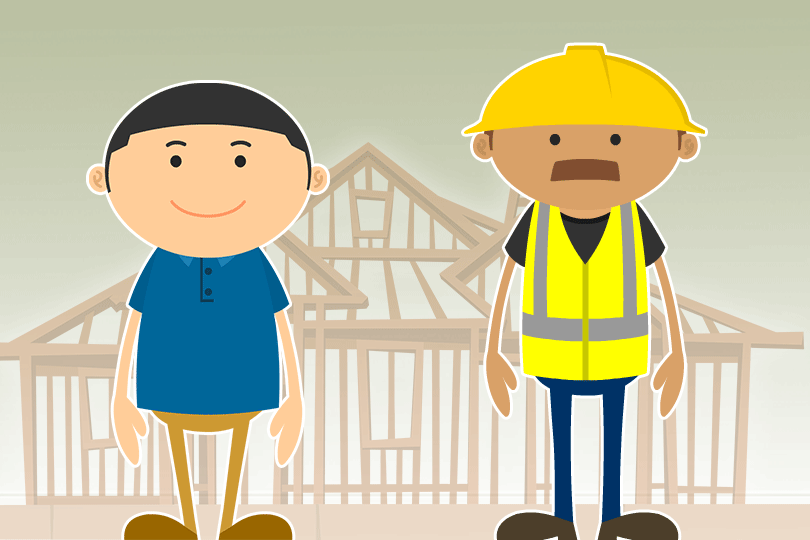The Cost of Building a Home in 2024: Industry Predictions

Some signs indicate a much better environment to consider your options than in the last few years.
A commercial real estate company called JLL releases an annual forecast that includes predictions about the construction industry, and some of those predictions may mean good things for those hoping for lower home loan costs in the new year.
JLL's 2024 forecast notes that the construction industry, including work done on homes built with One-Time Close construction loans, could be a busy one, and less expensive than in the last couple of years.
That’s despite a slower pace in some areas, higher rates, and a recovery from the previous seller’s market.
What Affects Construction Loan Trends in 2024?
Some market watchers (with the benefit of hindsight) declared 2023 the year that the construction industry “stabilized” post-COVID. 2023 was also a time when the industry realized the benefit of improving the supply chain. There had been previous supply issues for housing projects related to the global pandemic that no longer apply.
JLL predicts that the industry will experience more price stability for raw materials used to build homes with, but that comes with a trade-off.
Costs may be higher in the new year. JLL predicts the cost increases could run as high as 4% in many cases. Electrical components may experience increases closer to 6%.
Labor Issues in 2024
One factor that could prove to be a spoiler, price-wise in some cases? A shortage of labor. JLL notes that in 2024, construction project hiring could be a serious challenge for some.
“Labor shortages are expected to persist, and construction wages will increase to stay competitive, probably in the 3 percent to 5 percent range.”
The supply chain may be improving, but the amount of available labor may not be doing so well. JLL notes limited labor resources are likely to be an ongoing problem that could slow the growth and recovery of the housing market.
Looking Ahead
The bottom line in all the above seems to be time. Borrowers may need more time to save and plan their loan, and there may be added time required to find the right builders for your project.
Lower costs don’t offset labor shortages, and it may take longer than you anticipate to complete the project. But the extra time and effort is worth it for many borrowers.
 FHA, VA, and USDA: One-Time Close Loans
FHA, VA, and USDA: One-Time Close Loans
Want More Information About One-Time Close Loans?
We have done extensive research on the FHA (Federal Housing Administration) and the VA (Department of Veterans Affairs) One-Time Close Construction loan programs. We have spoken directly to licensed lenders that originate these residential loan types in most states and each company has supplied us the guidelines for their products. We can connect you with mortgage loan officers who work for lenders that know the product well and have consistently provided quality service. If you are interested in being contacted by a licensed lender in your area, please send responses to the questions below. All information is treated confidentially.
FHA.com provides information and connects consumers to qualified One-Time Close lenders to raise awareness about this loan product and to help consumers receive higher quality service. We are not paid for endorsing or recommending the lenders or loan originators and do not otherwise benefit from doing so. Consumers should shop for mortgage services and compare their options before agreeing to proceed.
Please note that investor guidelines for the FHA and VA One-Time Close Construction Program only allows for single family dwellings (1 unit) – and NOT for multi-family units (no duplexes, triplexes or fourplexes). In addition, the following homes/building styles are not allowed under these programs, including but not limited to: Kit Homes, Barndominiums, Log Cabin Homes, Shipping Container Homes, Stilt Homes, Solar (only) or Wind Powered (only) Homes, Dome Homes, Bermed Earth Sheltered Homes, Tiny Homes, Accessory Dwelling Units, or A-Framed Homes.
Contact Us: Send Us Your Request – Spam Safe
Please send your email request to [email protected] which authorizes FHA.com to share your personal information with one mortgage lender licensed in your area to contact you.
1. Send your first and last name, e-mail address, and contact telephone number.
2. Tell us the city and state of the proposed property.
3. Tell us your and/or the Co-borrower’s credit profile: Excellent – (680+), Good - (640-679), Fair – (620-639) or Poor- (Below 620). 620 is the minimum qualifying credit score for this product.
4. Are you or your spouse (Co-borrower) eligible veterans? If either of you are eligible veterans, down payments as low as $0 may be available up to the maximum amount your debt-to-income ratio per VA will allow – there are no maximum loan amounts as per VA guidelines. Most lenders will go up to $1,500,000 and review higher loan amounts on a case-by-case basis. If not, the FHA down payment is 3.5% up to the maximum FHA lending limit for your county.

Do you know what's on your credit report?
Learn what your score means.






